Baku Says Some Iranian Entities Behind Attack On Its Embassy In Tehran
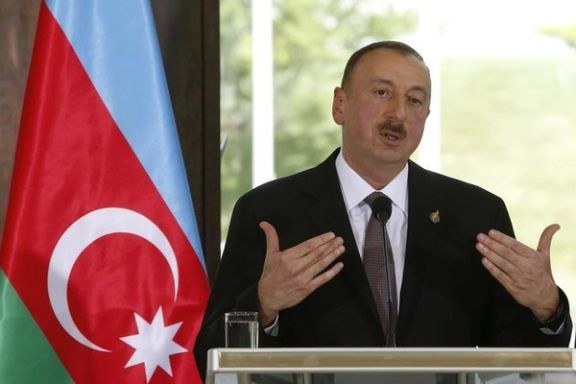
President of Azerbaijan Republic says entities related to the Iranian government were involved in the armed attack on the country's embassy in Tehran last month.

President of Azerbaijan Republic says entities related to the Iranian government were involved in the armed attack on the country's embassy in Tehran last month.
Speaking to reporters on the sidelines of the Munich Security Conference on Saturday, Ilham Aliyev said “normalization of relations with Iran depends on a transparent investigation that will bring the perpetrators (of the attack) to justice."
In an armed attack by an Iranian citizen on the embassy of the Republic of Azerbaijan on January 27, the head of the embassy's security was killed, and two other security staff were injured.
A day later, Baku evacuated its diplomatic staff and their families from the country and then suspended the activity of its embassy in Tehran. However, the relations between the two countries have not been interrupted and the Iranian embassy in Baku continues to work.
In his first criticism, Ilham Aliyev said the police's lack of swift action to stop the gunman and the fact that the state television interviewed the assailant immediately after his arrest showed he was sent "by some organizations of the Iranian regime."
The Islamic Republic says it has arrested the attacker, but it avoids “getting into a rush” in the case.
Tehran claims the gunman appeared to have had a personal, not a political, motive, but the Republic of Azerbaijan insists there is enough proof for this attack to be considered a terrorist act.
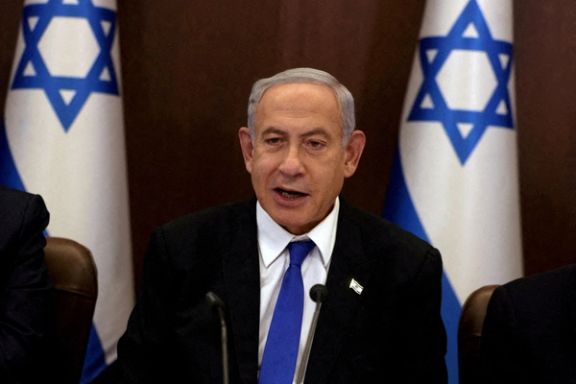
Israeli Prime Minister Benjamin Netanyahu on Sunday said that Iran was responsible for a reported attack on an oil tanker last week.
An attack on the Liberian-flagged Campo Square was confirmed on Saturday by the ship's captain, who said it was lightly damaged by an airborne object on February 10 while sailing through the Arabian Sea.
Shipping databases linked the tanker to Zodiac Maritime, which is controlled by Israeli shipping magnate Eyal Ofer.
"Last week Iran again attacked an oil tanker in the Persian Gulf and harmed the international freedom of navigation," Netanyahu said at a weekly cabinet meeting.
Regional defense and security sources have said they suspected the assault was carried out by Iran, which did not comment on the incident.
Tehran has rejected accusations it was behind similar attacks in the past few years.
British maritime security company Ambrey Intelligence said unmanned aerial systems had attacked two tankers and one bulk carrier in the Arabian Sea and assessed that Tehran had mounted the attack. Two of the merchant vessels were Israeli-owned and one was Emirati, it said.
The attack came during antagonism between Iran and the West over Tehran's nuclear activity and its supply of arms - including long-range "suicide drones" - for Russia's war in Ukraine, as well as months of anti-government demonstrations at home.
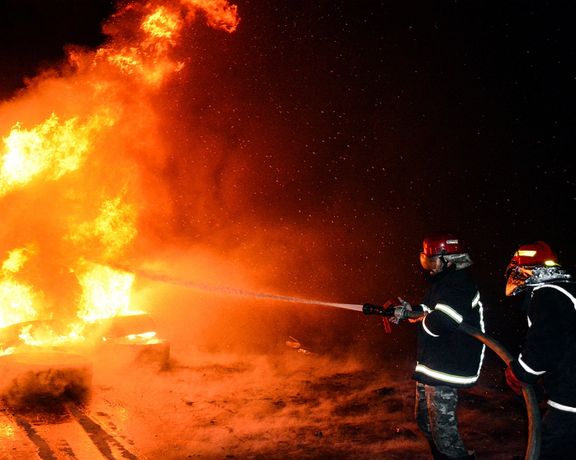
Iran’s foreign ministry condemned an Israeli rocket strike Sunday on “a residential area” in central Damascus, and the “martyrdom of several civilians.”
An Israeli rocket strike early on Sunday hit a building in central Damascus's Kafr Sousa neighborhood near a large, heavily guarded security complex close to Iranian installations, killing five people, witnesses and officials said.
Iran's foreign ministry spokesman Nasser Kanaani condemned the attack, which he likened to recent attacks by ISIS in Syria.
The rare, targeted strike damaged several buildings in the densely populated district close to Omayyad square in the heart of the capital, where multi-story security buildings are located within residential areas.
Iranian media reported 5 people killed and 15 injured, according to an early count. The Syrian Observatory for Human Rights reported that 15 people were killed in the attack.
An Israeli military spokesperson declined to comment.
Citing a military source, state media said Israel had carried out air strikes targeting several areas in the capital shortly after midnight, causing five deaths and 15 injuries among civilians, and damage to several residential buildings.
"It caused damage to several civilian homes and material damage to a number of neighborhoods in Damascus and its vicinity," the army said in a statement.
It was not immediately clear whether the strike was aimed at a specific individual.
Pro-Iran Hezbollah's top commander Imad Moughniyeh was killed in 2008 in a bombing in Kafr Sousa, a heavily policed area where residents say several Iranian security agencies are located, including a major cultural center.
Israel has been carrying out air strikes against suspected Iranian-sponsored weapons transfers and personnel deployments in next-door Syria since 2017. Iran has expanded its military presence in Syria in recent years and has a foothold in most state-controlled areas, with thousands of members of militias and local paramilitary groups under its command, Western intelligence sources say.
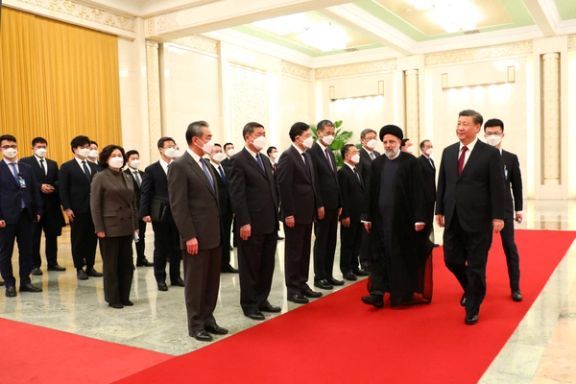
Islamic Republic's hardliner officials and media say President Ebrahim Raisi’s state visit this week to China “defeated the project to isolate Iran”.
“The Iranian president’s visit to Beijing was made at a time when western powers, with the help of some misled elements, were trying to isolate Iran in the international community. This visit ruined the enemies’ plans and defeated the project of isolating Iran,” Moslem Salehi, a member of the parliament’s economic committee told the official news agency (IRNA) Saturday.
Moslemi also said Iran can “challenge the unilateralism of the United States” as an influential country alongside Russia and China and argued that Beijing’s cooperation with Tehran at this juncture is proof of Iran's “political stability”.
As Iran's protest movement enters its sixth month, European powers are increasingly sending strong signals that they no longer consider diplomacy a viable route in their dealings with the Islamic Republic, without fundamental changes in Tehran’s policies.
In the latest development, the Islamic Republic not only lost an invitation to the Munich Security Conference, but also had to witness the presence of the Iranian opposition figures, most notably the exiled crown prince, Reza Pahlavi, who was a speaker at the conference. In an unattributed commentary Saturday, the official news agency (IRNA) slammed the exclusion of Iran, and its strategic ally Russia, from the conference.
Pro-government officials claim that tighter relations with China and Russia will balance out the pressure from the US and European powers. “To counter these pressures we need breathing space to be able to manage the country’s affairs,” conservative former lawmaker Seyed Reza Akrami told Khabar Online.
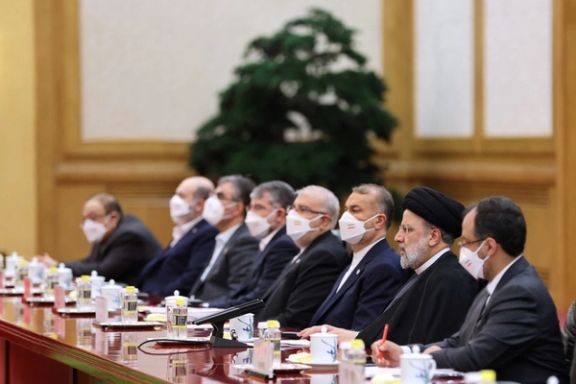
He argued that China’s invitation to the Iranian president was “extremely important” given that Iran has not agreed to the restoration of the 2015 nuclear deal, Joint Comprehensive Plan of Action (JCPOA) or acceded to the conventions of the Financial Action Task Force (FATF) which Raisi and other hardliners have strongly opposed.
Iran has been on the FATF blacklist, along with North Korea, since February 2018 for failing to pass legislation introducing transparency measures designed to combat money-laundering, corruption, and financing of ‘terrorism.’
Many analysts, politicians and former government officials in Iran say that failure to join the FATF is detrimental to economic relations with the world, including Russia and China, as foreign banks would still be wary over transactions with Iran.
According to the head of Iran’s Trade Promotion Organization (TPO) Alireza Peyman-Pak, during Raisi’s China visit the two countries signed “19 documents, contracts, and agreements in the fields of industry, mining, and trade, apart from another 20 major documents” to the tune of 3.5 billion dollars.
However, in a series of tweets on Friday, Hamid Aboutalebi, the political deputy of former President Hassan Rouhani’s office argued that Raisi’s] visit to Beijing would not result in a such a ‘strategic balance’.
In the joint statement of the two presidents, Aboutalebi pointed out, there is no mention of the 25-year Comprehensive Cooperation Agreement signed in 2021. There is also no word about Chinese nuclear cooperation with Iran, the modernization of the Arak heavy water reactor which in 2016 during Jinping’s visit to Tehran, they agreed to advance. Banking and financial cooperation was also not mentioned.
Aboutalebi claimed that China has only agreed to mention the lifting of US sanctions in the joint statement only within the context of reviving the 2015 nuclear deal.
Warning not to pin too much hope on China, he wrote, “So, let’s be aware that [Raisi’s] visit to Beijing will not result in a ‘strategic balance in Iran's foreign relation’.”
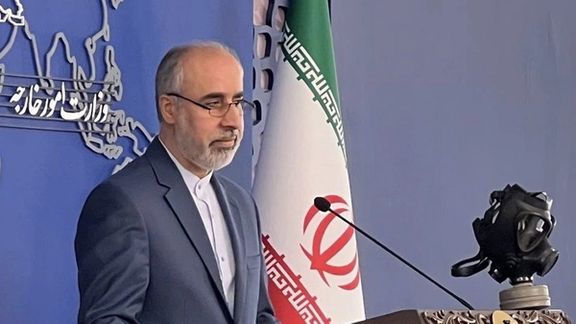
Iran’s foreign ministry spokesman Nasser Kanaani has said Washington is using a “carrot and stick” strategy trying to weaken Tehran’s will to resist its demands.
He also claimed that negotiations for a prisoner exchange are in limbo because “the American government did not act according to its promises.”
Kanaani visited the offices of the hardliner Mehr news website Saturday and spoke with the editorial staff about issues related to nuclear talks and American’s held in Iran.
“The West led by America has adopted a policy of attrition in negotiations, whereby they use every means of pressure, including instigating protests and [continuing] sanctions,” Kanaani said.
He insisted that Washington is indirectly communicating with Tehran, but parallel to talks it uses every means of pressure possible to bring Iran’s tolerance to the breaking point. Among these pressures, Kanaani also mentioned the Iranian opposition that he claimed has “no stature among the Iranian people.”
Tehran’s regime has been badly rattled by more than five months of popular anti-regime protests, with prominent activists in the diaspora uniting and calling for regime change in Iran. These activists have announced that their goal is putting pressure on Western government to support the protests, including listing the Revolutionary Guard as a terrorist organization in Europe.

NBC News reported February 15 that indirect negotiations were taking place for a possible prisoner exchange between the United States and the Islamic Republic. The report said that the two sides were exploring ways that could include a prisoner exchange and the release of $7 billion of frozen Iranian funds by South Korea. Apparently the talks were taking place as recently as this week, when US special envoy for Iran Robert Malley met with Omanis, a regular intermediary between Washington and Tehran.
NBC also reported that the release of the funds would be on the condition that the money will used for purchasing food, reminiscent of ‘food-for-oil’ arrangement during Saddam Hussein’s rule in Iraq in the 1990s.
Iran’s hardliner and anti-Western ruler Ali Khamenei would hardly accept such a condition, which would be humiliating for him and the regime that has already lost a lot of credibility in the eyes of a highly dissatisfied population.
Kanaani who said Iranian citizens arrested in the West for violating US sanctions should be freed, which would be at the heart of a “prisoner exchange” deal.
In fact foreigners held in Tehran are hostages who have been arrested on trumped-up charges and convicted in sham trials.
Kanaani also seemed to demand the release of a former Iranian diplomat convicted on terrorism charges and imprisoned in Belgium. Assadollah Asadi, an Iranian diplomat in Austria was arrested for plotting a 2018 bombing of an opposition rally in Paris and later convicted to a 25-year jail term.
The Biden Administration assumed office pledging to return to the 2015 nuclear deal (JCPOA) with Iran that former President Donald Trump has abandoned in 2018 and imposed sanctions on the Islamic Republic. After 18 months of talks with Iran, the diplomatic process came to a dead-end last September, with the US saying that it is no longer focused on reviving the accord.
In the meantime, anti-regime protests and a sharp deterioration in Iran’s economic situation has put the clerical regime under tremendous pressure. A prisoner deal could perhaps ease tensions and lead to more talks, Tehran hopes.
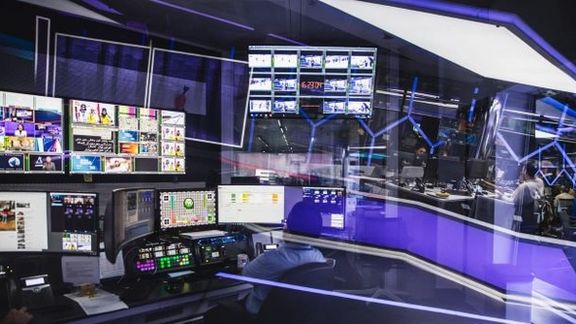
After a significant escalation in state-backed threats from Iran and advice from the Metropolitan Police, Iran International TV says it has reluctantly closed its London studios and moved broadcasting to Washington DC.
The station will continue to operate from its offices in Washington DC uninterrupted.
Threats had grown to the point that it was felt it was no longer possible to protect the channel’s staff, other employees at Chiswick Business Park and the general public.
Iran International was warned by authorities in November that its journalists were under threat from Iranian agents and the Metropolitan Police took measures to strengthen security around the network’s office in the area.
The channel's broadcasts have gained special significance since popular anti-regime protests broke out in Iran last September. Iranian officials have repeatedly threatened Iran International and other Persian broadcasters based abroad since the start of protests when the government blocked the Internet to deny the population news and information.
Amid repeated threats by the Islamic Republic against Iran International’s reporters, the UK government vowed in December to step up protection of London-based Iranian journalists.
British Foreign Minister James Cleverly said during a session in Parliament on December 13 that the Foreign and Commonwealth Development Office (FCDO), in partnership with the Home Office, had ensured that the Iranian journalists were protected by the British police.
“The UK remains absolutely determined to ensure that Iran does not intimidate people within this country. We will always stand up to the aggression from foreign nations,” he noted, adding, “We will absolutely not tolerate threats, particularly towards journalists who are highlighting what is going on in Iran, or indeed any other individual living in the UK.”
A man was arrested in the vicinity of Iran International’s headquarters last Saturday and charged with a terrorism offence. He pleaded not guilty in a court session on Tuesday.
Mahmood Enayat, General Manager of Iran International TV, said after the decision to move broadcasting to Washington:
“I cannot believe it has come to this. A foreign state has caused such a significant threat to the British public on British soil that we have to move. Let’s be clear this is not just a threat to our TV station but the British Public at large. Even more this is an assault on the values of sovereignty, security and free speech that the UK has always held dear.
Day and night our journalists strive to deliver the 85mn people of Iran and its diaspora the independent, uncensored news they deserve.
We refuse to be silenced by these cowardly threats. We will continue to broadcast.
We are undeterred.”